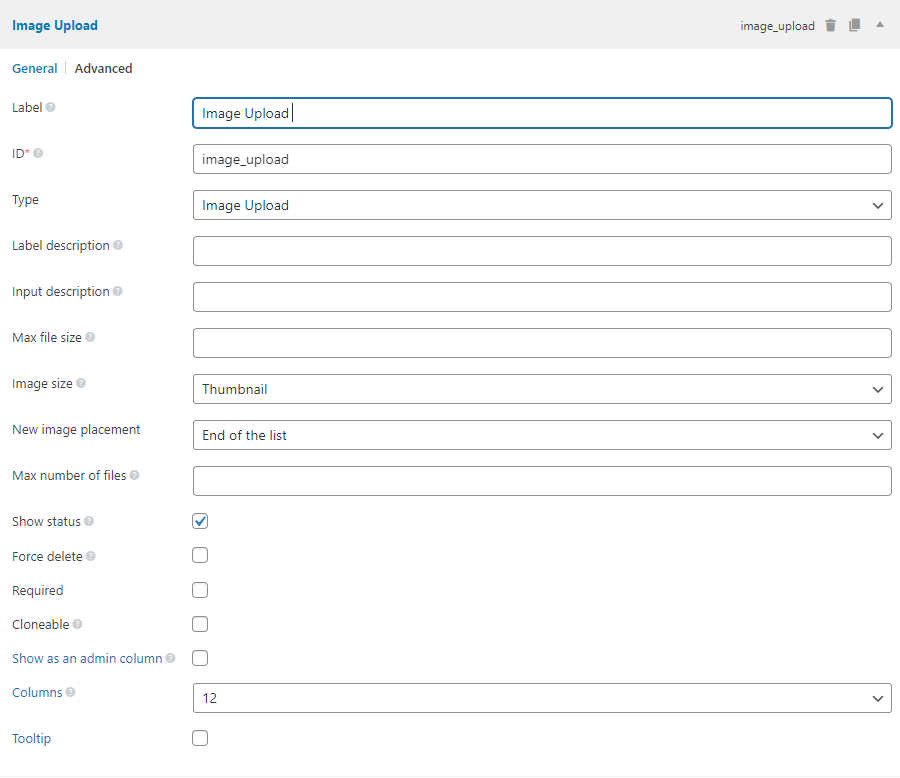Image Upload
The image upload field displays an inline upload area that you can drag and drop or select images to upload. It doesn't open the Media Library popup for selecting existing images. You can upload new images only.
Screenshots


Settings
Besides the common settings, this field has the following specific settings, the keys are for use with code:
| Name | Key | Description |
|---|---|---|
| Max number of files | max_file_uploads | Max number of uploaded files. Optional. |
| Force delete | force_delete | Whether or not delete the files from Media Library when deleting them from post meta. true or false (default). Optional. Note: it might affect other posts if you use the same file for multiple posts. |
| Show status | max_status | Display how many files uploaded/remaining. Applied only when "Max number of files" is defined. true (default) or false. Optional. |
| Image size | image_size | Image size displays in the edit page. Optional. Default "thumbnail". Image size is used to make sure images are not blurry. It’s not meant to display images with the exact width and height. Images are always displayed as a square. |
| New image placement | add_to | Whether to add new images to the beginning or the end of the list. beginning or end. Default end. Optional. |
| Max file size | max_file_size | Maximum file size that the user can upload, in bytes. Optionally supports b, kb, mb, gb, tb suffixes. e.g. "10mb" or "1gb". |
This is a sample field settings array when creating this field with code:
[
'id' => 'image',
'name' => 'Image upload',
'type' => 'image_upload',
'force_delete' => false,
'max_file_uploads' => 2,
'max_status' => false,
'image_size' => 'medium',
],
Data
This field saves multiple attachment IDs in the database. Each value (attachment ID) is stored in a single row in the database with the same meta key (similar to what add_post_meta does with the last parameter false).
Template usage
Displaying uploaded images:
<?php $images = rwmb_meta( 'my_field_id', ['size' => 'thumbnail'] ); ?>
<h3>Uploaded images</h3>
<ul>
<?php foreach ( $images as $image ) : ?>
<li><img src="<?= $image['url']; ?>"></li>
<?php endforeach ?>
</ul>
or simpler:
<h3>Uploaded files</h3>
<?php rwmb_the_value( 'my_field_id', ['size' => 'thumbnail'] ) ?>
rwmb_the_value() outputs images in an unordered list, and rwmb_meta() returns an array of images, each image has the following information:
[
'ID' => 123,
'name' => 'logo-150x80.png',
'path' => '/var/www/wp-content/uploads/logo-150x80.png',
'url' => 'https://example.com/wp-content/uploads/logo-150x80.png',
'width' => 150,
'height' => 80,
'full_url' => 'https://example.com/wp-content/uploads/logo.png',
'title' => 'Logo',
'caption' => 'Logo caption',
'description' => 'Used in the header',
'alt' => 'Logo ALT text',
'srcset' => 'large.jpg 1920w, medium.jpg 960w, small.jpg 480w', // List of responsive image src
'sizes' => [], // List of image sizes. See https://developer.wordpress.org/reference/functions/wp_get_attachment_metadata/
'image_meta' => [], // List of image meta. See https://developer.wordpress.org/reference/functions/wp_get_attachment_metadata/
];
Display images with links to the full-size versions (for lightbox effects):
<?php $images = rwmb_meta( 'my_field_id', ['size' => 'thumbnail'] ); ?>
<h3>Uploaded images</h3>
<ul>
<?php foreach ( $images as $image ) : ?>
<li><a href="<?= $image['full_url'] ?>"><img src="<?= $image['url']; ?>"></a></li>
<?php endforeach ?>
</ul>
or simpler:
<h3>Uploaded files</h3>
<?php rwmb_the_value( 'my_field_id', ['size' => 'thumbnail', 'link' => true] ) ?>
Displaying only one image:
<?php $images = rwmb_meta( 'my_field_id', ['limit' => 1] ) ?>
<?php $image = reset( $images ) ?>
<img src="<?= $image['url']; ?>">
The 2nd argument for rwmb_meta() and rwmb_the_value() is an array of extra parameters and accepts the following parameters:
| Name | Description |
|---|---|
size | Image size returned. Optional. Default thumbnail. |
link | Set to true to show a link to the full-size version. Default false. |
limit | Limit the number of returned images. |
Filters
This field inherits from file advanced and thus, uses the same filters to change the texts displaying on the screen.
| Filter | Default | Description |
|---|---|---|
rwmb_media_add_string | + Add Media | Add new image string |
rwmb_media_single_images_string | image | Singular "image" string |
rwmb_media_multiple_images_string | images | Plural "images" string |
rwmb_media_remove_string | Remove | Image remove string |
rwmb_media_edit_string | Edit | Image edit string |
rwmb_media_view_string | View | Image view string |
The code below changes the "+ Add Media" string:
add_filter( 'rwmb_media_add_string', 'prefix_change_add_string' );
function prefix_change_add_string() {
return '+ New Image';
}
Tutorials
How to display uploaded images as a WordPress image gallery?